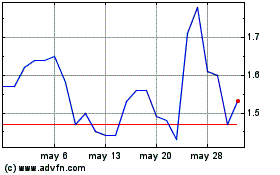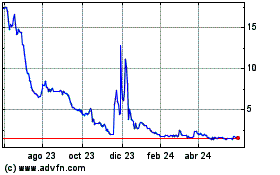- Interim analysis of Australian NASAR trial in seasonal
allergic rhinitis shows statistically significant improvement with
Bentrio® in nasal symptom primary endpoint over saline nasal spray
comparator
- NASAR main trial phase completed; full read-out
expected in Q2 2023
- Top line data from COVAMID trial in acute COVID-19 show
trend for more pronounced reduction in nasal viral load and
symptoms than no treatment, but primary endpoint not
met
Altamira Therapeutics Ltd. (NASDAQ:CYTO), a company dedicated to
developing therapeutics that address important unmet medical needs,
today provided an update on the clinical trials with Bentrio® in
seasonal allergic rhinitis (SAR) and acute COVID-19. Bentrio nasal
spray is intended to help protect against airborne allergens and
viruses.
Summary of Results
NASAR: Interim Analysis Shows Superior Efficacy of Bentrio in
Seasonal Allergic Rhinitis
An interim analysis based on the accumulated data from the first
53 participants in the NASAR trial showed a statistically
significant reduction of nasal symptoms with Bentrio vs. saline
nasal spray comparator as well as good tolerability and safety. The
mean reflective Total Nasal Symptom Score (rTNSS) as the primary
efficacy endpoint decreased in the Bentrio group from 6.7 points in
the pre-treatment period to 5.1 points over the 14-day treatment
period, while the saline spray group showed a decrease from 7.6 to
7.1 points. The treatment effect of 1.55 points in favor of Bentrio
was statistically significant in the ANCOVA model (LSmeans; p =
0.015; 95% confidence interval -2.78 to -0.32). The result is well
above the minimal clinically important difference of 0.28 points.
The interim analysis further showed good tolerability and safety
both for Bentrio and the comparator.
For eligibility in the NASAR trial, patients had to rate their
rTNSS at 5 points or higher, among meeting other requirements. The
TNSS comprises ratings for nasal congestion, sneezing, nasal
itching, and rhinorrhea (runny nose) and has a maximum score of 12
points. Participants were randomized at a 1:1 ratio to either
receive Bentrio or saline spray via self-administration three times
per day, or as needed. Since the interim analysis confirmed the
validity of assumptions for the statistical powering of the study,
enrollment into the trial was completed at n = 100, as planned. The
last patient recently completed its last study visit; the results
from the complete trial are expected to become available in Q2
2023.
COVAMID: Top-Line Data from COVID-19 Trial
Top-line data from the COVAMID trial in 160 patients with
current COVID-19 infection show a trend for a more pronounced
improvement in the Bentrio treatment groups on the primary efficacy
endpoint, the change in PCR cycle threshold (CT), compared with no
treatment.
The mean increase in the CT value from baseline to Day 11, was
15.3 for the Bentrio group, 14.1 for the modified-Bentrio group and
13.7 for the untreated control group. An increase in the CT by 1
indicates a decrease in the nasal viral load of 50%. In the mixed
model for repeated measures (MMRM) the difference in the mean
change of CT values of the Bentrio group vs. the untreated and the
modified-Bentrio groups to Day 11 failed to reach statistical
significance (LSmeans 0.8 and 0.64; p = 0.319 and 0.427; 95% CI
-0.78 to 2.38 and -0.95 to 2.23, respectively).
More Bentrio and modified-Bentrio treated patients achieved full
resolution of COVID-19 signs and symptoms by Day 11 than untreated
patients (93.7 and 92.5 vs. 85.0%) and more of them were uninfected
or asymptomatic at that time point (59.5 and 65.0 vs. 45.0%). The
treatment was well tolerated. The incidence of adverse events in
the Bentrio group was 2.4% (mild cases only), 9.5% in the
modified-Bentrio group (mild cases only), and 16.3% in the
untreated group (all mild, except for 1 moderate case and 2 severe
cases / unwitnessed sudden death after Day 11).
The COVAMID trial enrolled patients in Bulgaria and North
Macedonia suffering from acute COVID-19 (confirmed by positive PCR
test) up to 3 days from symptom onset. They were randomized at a
2:1:1 ratio to receive for 10 days either Bentrio, modified Bentrio
(lacking one mineral ingredient) or no treatment, followed by a
10-day observation phase. During the study period, Omicron was the
predominant SARS-CoV-2 variant in the population of the study
countries. Based on an estimated incubation time of 3 days,
participants of the COVAMID trial started treatment on average 4.5
days post infection.
CEO Discussion of Clinical Study Results
“We are very excited about the strong efficacy signals observed
with Bentrio at the halfway point of the NASAR seasonal allergic
rhinitis trial in Australia,” commented Thomas Meyer, Altamira
Therapeutics’ founder, Chairman, and CEO. “These results
demonstrate a significant therapeutic benefit with Bentrio under
real-life conditions over saline nasal sprays, which are currently
the most frequently used drug-free treatment option for allergic
rhinitis.
“Importantly, the improvement of nasal symptoms appears to
approach the magnitude achieved with certain medicated nasal
sprays, and there was no rebound observed during the week after
conclusion of the treatment period. We very much look forward to
the data from the completed trial next quarter, which we expect to
greatly expand and complement the positive efficacy and safety data
from our earlier challenge studies in seasonal and perennial
allergic rhinitis. We consider the market for over-the-counter
allergy remedies as very attractive, as it is estimated to reach
close to $4 billion in US sales in 2023 alone and, in our view,
offers great opportunities in the segment of non-medicated,
preservative-free treatments.
“At the same time, we are encouraged by the top-line results
from the first proof-of-concept trial in viral infection. Although
the COVAMID study did not reach the primary efficacy endpoint, we
observed a trend for faster and more pronounced reduction in the
nasal viral load, which was corroborated by a similar trend in
COVID-19 related symptoms. However, in retrospect, given the more
benign infection course with Omicron than with previous variants, a
larger sample size would have been required to enhance the
statistical power of the study.
“In addition, our research has shown that Bentrio’s protective
effects are most pronounced when the product is used in prophylaxis
– that is when inhaled airborne particles can be prevented from
contacting the nasal mucosa and be trapped in the protective gel
film formed by the nasal spray. Given Bentrio’s mode of action,
this applies to acute exposure to various types of potentially
harmful particles.”
About Bentrio Bentrio is an OTC drug-free nasal
spray for personal protection against airborne allergens and, where
approved, against airborne viruses. Upon application into the nose,
Bentrio forms a protective gel layer on the nasal mucosa. This thin
film is designed to prevent the contact of allergens (or virus
particles) with cells; in addition, the composition serves to bind
such particles and help with their discharge. Together, this is
designed to promote alleviation of allergic symptoms (or mitigate
upper respiratory tract viral infections). For more info,
visit: https://altamiratherapeutics.com/our-products/bentrio
About Altamira Therapeutics Altamira Therapeutics
(NASDAQ:CYTO) is dedicated to developing therapeutics that address
important unmet medical needs. The Company is currently active in
three areas: the development of RNA therapeutics for extrahepatic
therapeutic targets (OligoPhore™ / SemaPhore™ platforms;
preclinical), nasal sprays for protection against airborne
allergens and, where approved, viruses (Bentrio™; commercial) or
for the treatment of vertigo (AM-125; post Phase 2), and the
development of therapeutics for intratympanic treatment of tinnitus
or hearing loss (Keyzilen® and Sonsuvi®; Phase 3). Founded in 2003,
it is headquartered in Hamilton, Bermuda, with its main operations
in Basel, Switzerland. For more information,
visit: https://altamiratherapeutics.com/
Forward-Looking Statements This press release may contain
statements that constitute "forward-looking statements" within the
meaning of Section 27A of the Securities Act of 1933 and Section
21E of the Securities Exchange Act of 1934. Forward-looking
statements are statements other than historical facts and may
include statements that address future operating, financial or
business performance or Altamira Therapeutics' strategies or
expectations. In some cases, you can identify these statements by
forward-looking words such as "may", "might", "will", "should",
"expects", "plans", "anticipates", "believes", "estimates",
"predicts", "projects", "potential", "outlook" or "continue", or
the negative of these terms or other comparable terminology.
Forward-looking statements are based on management's current
expectations and beliefs and involve significant risks and
uncertainties that could cause actual results, developments and
business decisions to differ materially from those contemplated by
these statements. These risks and uncertainties include, but are
not limited to, the success of the continued commercialization of
Bentrio and success of strategic transactions, including licensing
or partnering, with respect to Bentrio or any other legacy assets,
Altamira Therapeutics' need for and ability to raise substantial
additional funding to continue the development of its product
candidates, the timing and conduct of clinical trials of Altamira
Therapeutics' product candidates, the clinical utility of Altamira
Therapeutics' product candidates, the timing or likelihood of
regulatory filings and approvals, Altamira Therapeutics'
intellectual property position and Altamira Therapeutics' financial
position, including the impact of any future acquisitions,
dispositions, partnerships, license transactions or changes to
Altamira Therapeutics' capital structure, including future
securities offerings. These risks and uncertainties also include,
but are not limited to, those described under the caption "Risk
Factors" in Altamira Therapeutics' Annual Report on Form 20-F for
the year ended December 31, 2021, and in Altamira Therapeutics'
other filings with the SEC, which are available free of charge on
the Securities Exchange Commission's website
at: www.sec.gov . Should one or more of these risks or
uncertainties materialize, or should underlying assumptions prove
incorrect, actual results may vary materially from those indicated.
All forward-looking statements and all subsequent written and oral
forward-looking statements attributable to Altamira Therapeutics or
to persons acting on behalf of Altamira Therapeutics are expressly
qualified in their entirety by reference to these risks and
uncertainties. You should not place undue reliance on
forward-looking statements. Forward-looking statements speak only
as of the date they are made, and Altamira Therapeutics does not
undertake any obligation to update them in light of new
information, future developments or otherwise, except as may be
required under applicable law.
Investors@altamiratherapeutics.com
800-460-0183
Altamira Therapeutics (NASDAQ:CYTO)
Gráfica de Acción Histórica
De Dic 2024 a Ene 2025

Altamira Therapeutics (NASDAQ:CYTO)
Gráfica de Acción Histórica
De Ene 2024 a Ene 2025
